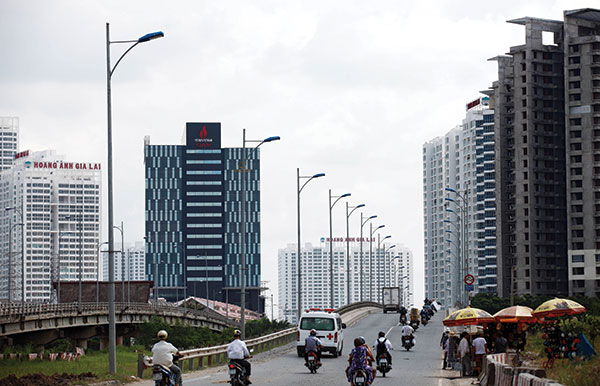Bad debts spell bad news for Vietnam banks
10-10-2013
 The NPL market in Vietnam appears to be open for business and how we got here has been a long story. There is however an urgent need to stop talking and start acting as many experts have predicted the property market can’t recover until the NPL issue in Vietnam is resolved either via the Vietnam Asset Management Company (VAMC) or other routes.
The NPL market in Vietnam appears to be open for business and how we got here has been a long story. There is however an urgent need to stop talking and start acting as many experts have predicted the property market can’t recover until the NPL issue in Vietnam is resolved either via the Vietnam Asset Management Company (VAMC) or other routes.
Vietnam’s banks seem to be currently struggling with a lack of expertise in NPLs. It is clear that existing approval teams don’t have the necessary skill sets to carry out the analysis or to process, assess and then make practical and set procedures to resolve an NPL on a property.
The skills needed for NPLs are not the same as credit approvals and it’s a strong recommendation that separate and appropriately trained teams undertake NPL mitigation.
Property valuers should be part of the process. The NPL team at a bank can and will revise the loan documents, but don’t necessarily have the skills to assess the asset, its risks and most importantly, its value and ability to realise its price.
The bank staff can seldom determine added value which may not be immediately obvious. Not all property has a negative price point once it has been categorised as an NPL.
Does Vietnam have NPL experts?
The short answer is no. Currently there appears to be a real lack of knowledge and skill base in Vietnam in this field. Observations from the past when dealing with an NPL team leads us to conclude that the team should be a group of trained specialists operating as a specialist recovery group. They require a special set of skills, and an understanding of the various risks of NPLs. The team members also need to have strong legal knowledge and the ability to negotiate and be solution orientated. The property team should have the ability to value the land and buildings, and, when possible, ignore internal forces. They should be independent and reliable valuers who can identify properties’ advantages and disadvantages.

The property market’s downturn has exacerbated the problem of non performing loans, Photo: Le Toan
Is an NPL property assessment different?
The definition of property value, in brief, is the value of the asset on a given day, or when the property is sold by a willing seller to a willing buyer, and both parties have acted prudently. Properties at NPL level are not always sold or offered to the market in this way, and this is where they differ. The skill sets required to assess and determine how to advise the lender are seldom practiced by the banks and appear not as developed as yet by valuers in Vietnam.
Vietnam has a real NPL dilemma, which combined with insufficient skill sets will possibly result in the banks making poor decisions on asset values, and not being able to clearly or independently arrive at the disposal value.
What’s next for Vietnam NPLs?
There is most likely going to be mistakes made unless the banks put in clear credit changes. The independence of the NPL team must be a key consideration and external help is essential. The most common form of loans is a mortgage or pledge but the process in dealing with one that does not perform well, is most uncommon.
The VAMC is seeing some activity and the banks are internally addressing the issue. The overall position of the NPL problem in Vietnam will not be resolved immediately. To give the banks some sound advice they need to deal with the problem earlier rather than later. Other countries that left the problem to simmer saw low realisation values. Many experiences globally saw values or losses in loan portfolios at an average of 60 per cent. That’s a remaining average value of 40 per cent. We are unaware at this time if the banks locally have calculated such losses.
Where is the risk?
KPMG’s recent combanking survey reported that corporate lending accounted for nearly half of the total loans that were outstanding. Near 30 per cent of outstanding loans are for retail customers and some 16 per cent are for state-owned enterprises. Only two per cent of loans outstanding are to foreign invested enterprises, which implies that many borrowed from foreign owned banks and branches.
The Navibank and Asia Commercial Bank are reported to have lodged plans to sell NPLs to the VAMC.
The latest data from the State Bank of Vietnam indicates NPLs by the end of June decreased for the second consecutive month and stood at 4.46 per cent of total credit lending. There is much debate that this is higher than the reality. As an example, Ireland reported NPL ratios of just a few percentage points, but their losses were substantial with the Irish AMC (NAMA) paying 56 cents in the dollar which experts considered to be high. The property market reacted and fell over 30 per cent during 2010.
Disastrous commercial-property lending made the Irish banking sector a black hole for recapitalisation. The comparison leads one to think that Vietnam’s commercial values need revising and should be based on valuation modelling and more stringent rules and regulations. Most property markets failed off the back of unrealistic or fundamentally wrong valuations.
The global experience has seen average bank global clearing rates for NPLs as low as 30 cents in the dollar.
Will the VAMC work?
The VAMC is to purchase debt at book value, then sell it at market value. It is still unclear at what point was the book value determined and in light of the market downturn these values are most likely unrealistic. In addition, the valuations were internal or completed by companies associated with the authorising bank. What happens when the bank has to sell the debt at a discount? Who will cover the loss? It’s likely that the banks and their borrowers will have to share the losses. The tax payer also needs to ensure they are not paying the future bill.
We believe that there is an unwillingness from banks at this time to use the VAMC framework. The bank has to report to the VAMC the amount of the bad debt and the source of that debt. There is the issue of liability for a future loss and it seems that the resolution to force banks to sell NPLs to the VMAC does not have all bases covered.
There is no doubt that the industry and experts in the main believe that unless laws are changed, the NPL process will be a heavy weight that Vietnam will continue to carry.
In any event, this issue won’t go away on its own.
http://www.vir.com.vn/news/en/property/bad-debts-spell-bad-news-for-banks.html






